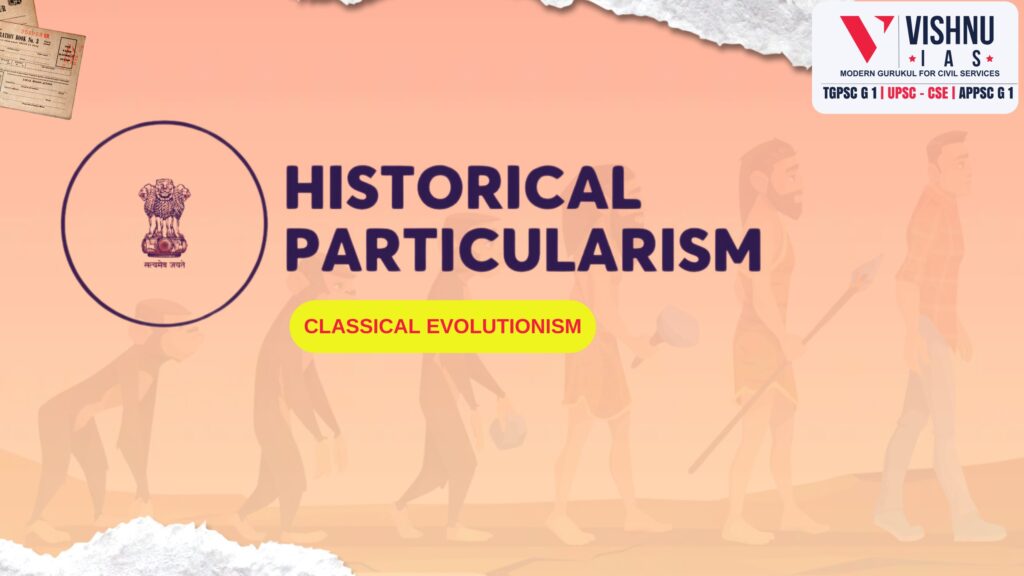Discuss Historical Particularism as a Critical Development to the Classical Evolutionism. (20) Approach
⦁ Introduction: add the basic concept related to the historical particularism
⦁ Body: add the basic tenets of both schools then Discuss historical particularism as a critical development to the classical evolutionism with critical evaluation.
⦁ Conclusion: it must be in anthropological point of view.
INTRODUCTION
Historical particularism emerged as a significant critique and alternative to the classical evolutionism that dominated anthropology in the late 19th and early 20th centuries.
BODY
Here’s an overview of both theories and how historical particularism critically developed from classical evolutionism:
Classical Evolutionism
Overview:
⦁ Classical evolutionism posits that all societies progress through a series of stages from “savagery” to “civilization” in a unilinear fashion. Key proponents included Herbert Spencer, Edward Burnett Tylor, and Lewis Henry Morgan.
⦁ Key Concepts:
⦁ Unilinear Evolution: The idea that all societies follow the same developmental path.
⦁ Stages of Development: Societies evolve through stages such as savagery, barbarism, and civilization.
⦁ Ethnocentrism: This theory often implied that Western societies were the pinnacle of cultural evolution, leading to ethnocentric biases.
Historical Particularism
Overview:
⦁ Historical particularism, developed by Franz Boas and his students, argued that each society has its own unique historical development and must be understood within its specific cultural and environmental context
⦁ Key Concepts:
⦁ Cultural Relativism: The idea that cultures should be understood based on their own values and norms rather than judged against another standard.
⦁ Fieldwork and Ethnography: Emphasis on collecting detailed, first-hand data through fieldwork to understand the particularities of each culture.
⦁ Rejection of Unilinear Evolution: Boas and his followers rejected the notion that all societies follow the same evolutionary path.
Critical Development
⦁ Rejection of Ethnocentrism:
⦁ Historical particularism challenged the ethnocentric biases of classical evolutionism by emphasizing that no culture is inherently superior to another. This shift promoted a more respectful and accurate understanding of cultural diversity.
⦁ Focus on Cultural Context:
⦁ Unlike classical evolutionism, which sought universal laws of cultural development, historical particularism stressed the importance of understanding each culture within its unique historical and environmental context. This approach highlighted the diversity of human experiences and cultural expressions.
⦁ Methodological Rigor:
⦁ Boas and his students emphasized rigorous fieldwork and the collection of empirical data. This methodological shift laid the foundation for modern anthropological research, moving away from speculative theories to evidence-based studies.
⦁ Cultural Relativism:
⦁ Historical particularism introduced the concept of cultural relativism, which became a cornerstone of anthropological thought. This perspective encourages understanding cultures on their own terms and has had a lasting impact on the field.
Present Relevance
⦁ Cultural Sensitivity:
⦁ The principles of historical particularism continue to influence contemporary anthropology by promoting cultural sensitivity and respect for diversity. This approach is crucial in a globalized world where cross-cultural interactions are common.
⦁ Ethnographic Research:
⦁ The emphasis on detailed ethnographic research remains a fundamental aspect of anthropological methodology. Understanding the particularities of different cultures helps address global challenges such as migration, conflict, and development.
Challenges and Limitations
⦁ Anti-Theoretical Criticism:
⦁ Critics argue that historical particularism can be overly descriptive and lacks the theoretical framework to make broader generalizations about human societies. This limitation can hinder the development of comprehensive theories in anthropology.
⦁ Balancing Particularism and Generalization:
⦁ While focusing on the unique aspects of each culture is essential, there is also a need to identify patterns and commonalities across cultures. Balancing particularism with the search for general principles remains a challenge for anthropologists.
CONCLUSION
Historical particularism marked a critical development in anthropology by challenging the ethnocentric and unilinear assumptions of classical evolutionism. It emphasized the importance of cultural context, rigorous fieldwork, and cultural relativism, shaping the field into a more respectful and scientifically grounded discipline. Despite its challenges, the legacy of historical particularism continues to influence contemporary anthropological thought and practice.
Anthropology Full Course at Vishnu IAS Academy
What does Course Offer?
- 4 Months (250+ Class Hours)
- Online (App + Web) / Offline / Hybrid Mode of Classes
- Live + Recorded Videos Access For 1 Year
- 2 Hour Live Class From Monday to Saturday (1.5 Hours for Class + ½ Hour for Doubt Solving)
- Foundation to Advanced Level of Teaching
- Simple and Integrated Content
- One Stop Solution Books
- Regular Value Added Content
- Current Affairs & Case Studies Modules
- Daily Answer Writing Practice
- Weekly Grand Tests On Sundays & Evaluation With Guidance and Topper Will be Rewarded
- 500+ Model Answers
- 9 AM – 9 PM Support System
- Free GS Current Affairs
- Free Interview Guidance for Anthropology


